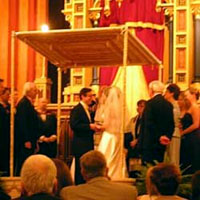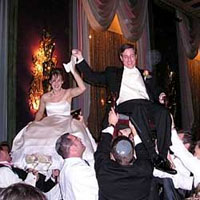Wedding Woes
Permanent link All Posts

A wedding of mixed religious faiths can be hard work.
A few years ago, I took the greatest risk of my life. I packed up my apartment in D.C., said goodbye to my friends and a great job, and moved to Cincinnati to be with my boyfriend, a Rabbinical student at HUC. The gamble paid off: two weeks after my move, he popped the question. After having dated for a little over five years, the engagement came as less than a surprise and more as a relief to our friends and family. (The relief on the side of my friends who were afraid they would have to carry out their threats and wind up in jail.)
To illustrate: my father’s response to our announcement was “Well, it’s about time.” Describing my father as having an odd sense of humor is an understatement. Then, just to be clear what we were dealing with, he continued with: “I’m not going up in the chair, and I’m not wearing one of those hats.” Oy vey.
Let me explain: my husband is Jewish and, while dating my husband, I converted to Judaism. While my entire family has been overwhelmingly supportive of my religious choice, I knew that with my Jewish wedding, I had a challenge on my hands that went beyond finding a dress that didn’t make me look like the stay-puff marshmallow woman and didn’t cost more than my car. I needed to find a way to incorporate my Christian family into my Jewish wedding ceremony while respecting their personal boundaries and religious views.
Easier said than done. So many married couples I know can tell their own wedding woes of dealing with family jealousies that arise during wedding planning. Which side has more guests? Who is paying for said guests? Just how much should this wedding cost? Which home town does the wedding take place in? Now add: Which side gets to understand and participate in the wedding ceremony?
But after all the intense negotiations that resolved issues about venue, budget, and details, we were at the point of no return. And I’m glad: our wedding afforded the opportunity for each side to learn about our respective religious backgrounds. It was the best thing that we ever could have done to merge our families together.
Now, while we are blessed with open minded family members, we had some work cut out for us with families very different from each other. (Philly, meet Texas. Yo y’all.) And I’m pretty sure that my husband and I are the only Jewish people my aunts, uncles and cousins know because, quite simply, they live in areas where white, Anglo-Saxon Protestants are the overwhelming majority. No one in my family, parents included, had ever been to a Jewish wedding. The Hora was going to rock their worlds.
My husband’s side wondered just how my family would react to my choosing the Jewish faith. Would my family resent my husband’s side? Would they be comfortable during the ceremony and reception? Would they feel included? Would my family pat their heads looking for horns? (That wasn’t meant to be funny, honestly my grandparents probably would have.) So, my husband and I looked at our wedding as an opportunity to build bridges between our cultural and religious differences. Thanks to the open-mindedness of our family, and the open bar, the day couldn’t have gone any better. Here’s what we did:
First, each of us spoke to our parents about what we wanted. We made it perfectly clear that what was incorporated into our wedding ceremony was not about what “we had to do” but what we wanted to do. This was especially important to my parents, to know that their daughter was having the wedding that she wanted, not just doing what the groom’s side wanted. Believe me, this is the key. And it worked on all the decisions we made about the wedding details, so that each side knew this is what WE wanted, not what his-or my-parents dictated.
Second, we were up-front with the Rabbis that my family was to be included as fully as my husband’s family. This may have limited the Rabbis that agreed to perform our wedding, but this was a deal-breaker.
Third, we held a class for our non-Jewish friends and family on Jewish wedding rituals. Our friend, also an HUC student, taught the ‘class’ Saturday afternoon (our ceremony was late Saturday night.) The best part was that plenty of people from my husband’s side showed up either because they never fully knew about all the traditions and wanted to learn, or just wanted to keep my side company. THAT is Texas hospitality.
Fourth, we explained everything in our wedding program. Ok, so the program turned out more of a wedding manual than a program, but who cares? There is nothing worse than sitting through a ceremony when you don’t know what is going on. Besides, it gave our guests something to read during the 20 minutes it took for my Father-in-law to recover from fainting.
Fifth, and most importantly, we respected the boundaries of our family members. I did not pressure my Dad, who is Baptist and does not drink nor dance, to participate in the Hora or wear a Kippot. And I kept him away from the Groom’s Tish. And my Mother-in-law respected my wishes not to have a Mikveh before the wedding.
In short, we threw away the manual and created our own way of doing things. The result was a fantastic wedding weekend where both sides really bonded. A few minds may even have been changed. Or, at the very least, my family now knows that yes, Rabbis can marry.

Celebration was in order after the wedding ceremony went off without a hitch.
That’s not to say that there weren’t a couple of moments where I wanted to crawl under a chair and die of embarrassment from the well-meaning but off-putting comments of some of my family members. Ok, so actually it was just one family member: my uncle’s fourth wife who can best be described as “country”.
Somewhere in the middle of her fourth or fifth beer she screeched out quite loudly on the dance floor more than once “I want to be Jewish!” Yes, she meant it as a compliment. However, I suspect her envy stemmed less from the meaning of the Jewish wedding rituals and more from the fun we were having (our band rocked.) Frankly, she was into the idea that dancing and drinking - of which she was a BIG fan- were not sins for which she’d burn in hell. (I should note my husband and I are Reform Jews. Had we been at an Orthodox wedding she may not have been as comfortable.) While I applaud her enthusiasm for Jewish people, at some point I think I’m going to have a discussion with her about what it really means to be Jewish. I might need a couple of beers in me for that.
Looking back, I realize that I underestimated my and my husband’s families. Where I feared there would be jealousy or rejection, I found willingness to learn and understand, not to tolerate but embrace Judaism as their daughter’s religion. I could not be more proud of their “Christian values” of love and acceptance that they displayed during my Jewish wedding. I wish the rest of the world was so. Now, can someone please help me explain the bris ceremony to my Dad? I think this time, HE might be the one who faints!
This story originally appeared in David’s Voice,
www.davidsvoice.com
.



.jpg)



